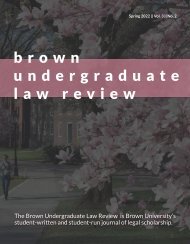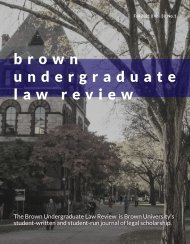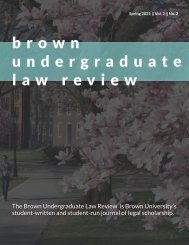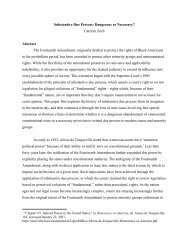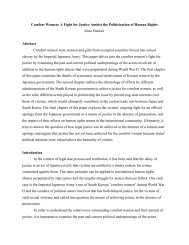Brown Undergraduate Law Review -- Vol. 2, No. 1 (Fall 2020)
We are proud to present the Brown Undergraduate Law Review's Fall 2020 issue. We hope you will all find our authors' works fascinating and thought-provoking.
We are proud to present the Brown Undergraduate Law Review's Fall 2020 issue. We hope you will all find our authors' works fascinating and thought-provoking.
You also want an ePaper? Increase the reach of your titles
YUMPU automatically turns print PDFs into web optimized ePapers that Google loves.
The Zenger Jury: A Mechanism of Legitimizing Popular Dissent
payment. To ensure he would win this tort, Cosby created a Libel and the Truth
new court consisting of his own appointees and no jury. 9
British common law primarily adopted libel laws to secure
When Van Dam contested this executive action in the New
the honor and authority of the elite ruling class. European
York Supreme Court, Cosby summarily dismissed the
restrictions against verbal defamation of individuals date
justice, Lewis Morris, who dissented from the majority
back to at least the fifth century CE. During this period, the
opinion and found for the councilman. 10 While Cosby
Salian Franks, who inhabited modern-day France, passed a
technically possessed the authority to make such decisions,
set of laws dealing with ?abusive? terms: ?He who calls
his decrees were ineffably self-serving and violated his
someone else a fox shall be liable to pay 120 denarii.? 13
civic duty to place the interests of the general public over
Similar punishments applied to the words ?pedergest? and
his own private interests. Public knowledge of these
?rabbit.? 14 These prohibitions aimed at preserving the
particular incidents became integral to Zenger?s acquittal.
community as well as the reputation of the defamed
In fact, the Cosby?Van Dam affair directly led to the
individual. The law explicitly did not allow an accused
Zenger trial. After his removal, Lewis Morris ran a
libeler to avoid punishment upon proving the truth of their
successful campaign for political office on an anti-Cosby
statement, likely because these insults were vague and
platform. To distribute and legitimize criticisms of Cosby,
subjective, unlike the enumerated grievances in Zenger?s
Morris funded a small printer, John Peter Zenger, turning
letter. Nevertheless, English common law co-opted these
his New York Weekly Journal into a political machine. 11
regulations, but with a novel focus on protecting the
One particularly scathing article caught the royal
nobility and their government rather than the general
governor?s attention. Published anonymously, although
community. English courts focused on a form of libel
popularly attributed to Van Dam?s attorney, the letter
known as scandalum magnatum, literally meaning
declared, ?We see men?s deeds destroyed, judges
?slandering or scandalizing the great men;? authorities
arbitrarily displaced, new courts erected, without consent
often declared this defamation a threat to the foundations
of the legislature . . . by which it seems tryals by juries are
of civil government, and thus ?a Disturbance of the
taken away when a governor pleases . . . Men of known
publick Peace.? 15 16 However, this publicized motive for
estates denied their votes, contrary to the received
scandalum magnatum laws thinly veiled the lawmakers?
practices.? 12 Unable to identify the anonymous author,
attempts to protect their own reputations. Indeed, most
Cosby instead ordered the arrest of the newspaper?s sole
seditious libel trials did not deal with systemic critiques of
publisher and editor, John Zenger, on account of seditious
monarchial government, but rather the behaviors of
libel.
individual officials, such as Governor Cosby?s
9. A tort is typically defined as an act which harms or injures an individual and constitutes a civil, not criminal, wrong. Injured parties can appeal to
courts to impose liability on the offender.
10. Lewis, 28?29.
11. Ibid.
12. John Peter Zenger, The Tryal of John Peter Zenger: of New-York, Printer, Who was Lately Try?d and Acquitted for Printing and Publishing a
Libel Against the Government, (London: printed for J. Wilford, behind the Chapter House, St. Paul?s Church, 1738), 11.
13. Katherine Drew Fischer, The Laws of the Salian Franks (Philadelphia: University of Pennsylvania Press, 1991), 94.
14. Ibid.; Note that the ?abusive term? prostitute could be rendered valid if the accused proved the woman was a prostitute. This is an anomaly,
however, and likely stems from sexist motivations irrelevant to the present discussion.
15. Elridge, 338.
16. Zenger, 1.
Brown Undergraduate Law Review
36




